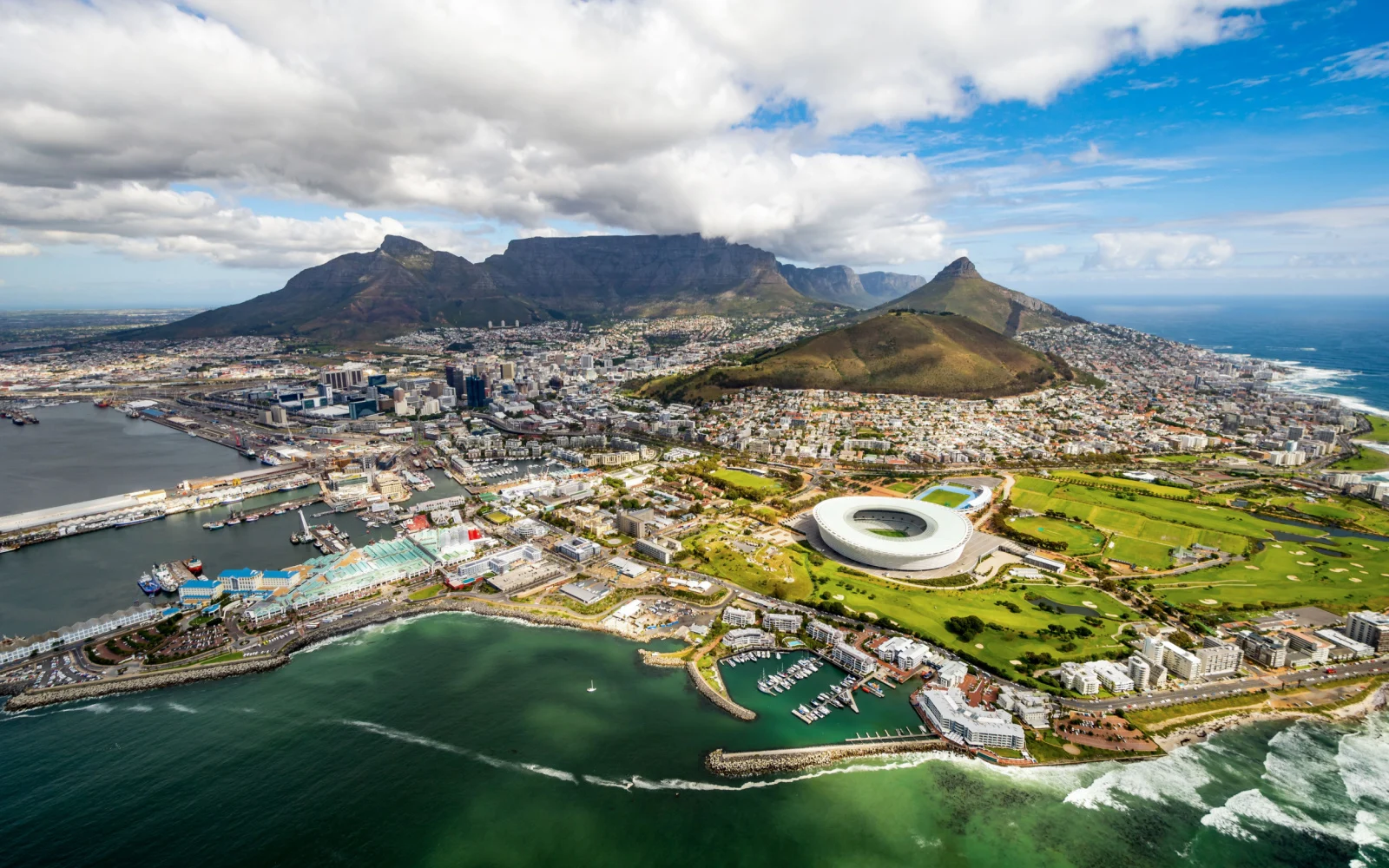What's the best time to visit Cape Town?
The best time to visit Cape Town is from March to May and September to November, offering pleasant temperatures and fewer tourists. This period features ideal weather for beach activities and outdoor exploration, with temperatures ranging from 68-77°F. Additionally, these months are great for wine tasting and attending vibrant festivals, with the added benefit of lower travel and accommodation costs.
If you are planning a trip to South Africa, don’t miss out on Cape Town. Join this breathtaking city’s 2.6 million yearly visitors, and discover the pristine natural beauty and unique landscape of the Western Cape.
To best enjoy all that Cape Town has to offer — from gorgeous forest canopies and deserted scenic shores to legendary monuments and cityscapes — you need to do a little research.
We’ll tell you everything you need to know about the best — and worst — times to visit Cape Town so you can enjoy the best weather and lowest price without the guesswork. Let us be your guide!
Overall Best Time to Visit Cape Town
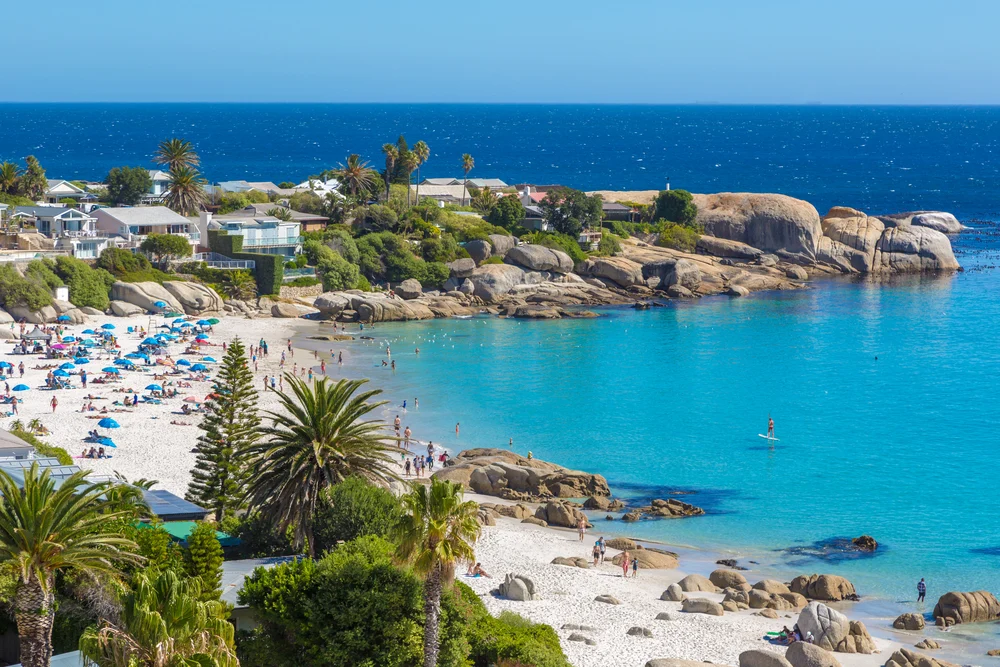
LMspencer/Shutterstock
The best overall time to visit Cape Town is between March and May or September and November. You’ll enjoy optimal weather, fewer tourists, and an authentic experience.
During these months, the temperature typically falls between 68-77 degrees Fahrenheit, and with low rainfall, you can comfortably lounge on the beach and stroll through the city.
In the Southern Hemisphere, the hottest (and most crowded) months fall between November and February, so springtime and autumn feature pristine, deserted beaches, lower hotel and travel costs, and more temperate weather.
Between June and August, rainfall is high, and temperatures are chilly, hovering around 60-64 degrees Fahrenheit.
Additionally, the harvest months of March through May are ideal for wine lovers, while the springtime season of September-November features fun festivals and nature in full bloom.
Cheapest Time to Visit Cape Town

Marisa Estivill/Shutterstock
The cheapest time to visit Cape Town is during the winter season of June to August. Although it is technically wintertime, temperatures hover between 60-67 degrees Fahrenheit — temperate conditions for most.
According to the city’s official tourism website, winter visitors are likelier to enjoy fewer crowds, off-season deals, peak whale-watching season, and verdant landscapes.
Book in advance to score the best deals on flights from a budget-friendly airline or website like Kayak or Orbit. The cheapest way to get around the city is the Golden Arrow Bus, which costs between $0.60 and $1.30, and public transportation is the least crowded during the winter months.
Additionally, some of the best restaurants offer winter specials to entice winter travelers, and many hotels, like the Boschendal and Big Sky Cottages, offer winter promotions at super-low prices. You can find articles on the best winter deals on most Cape Town news publications’ websites.
Least Busy Time to Visit Cape Town
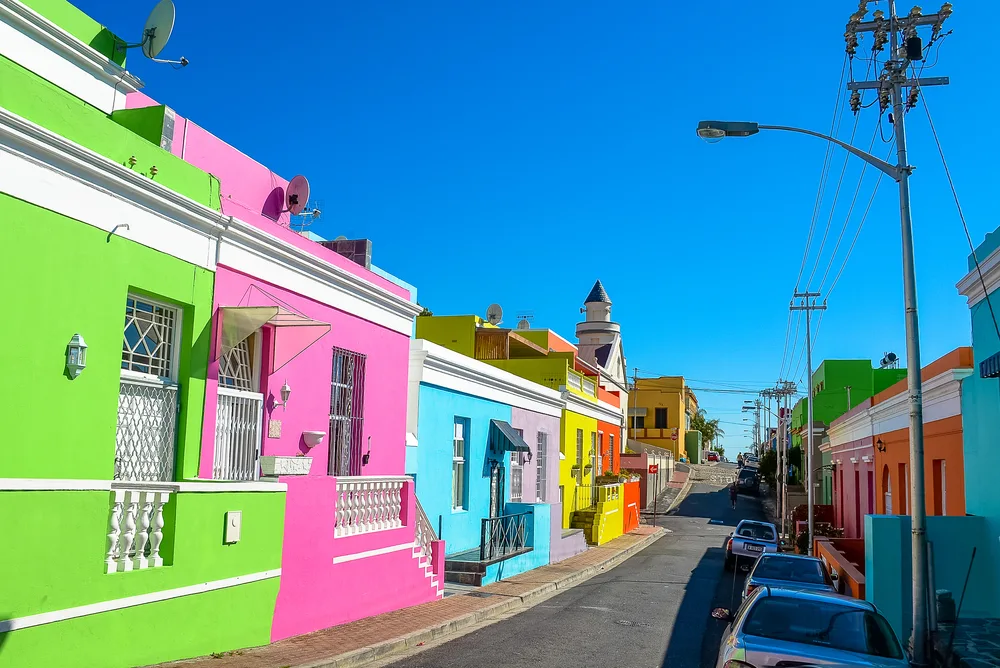
MG Africa/Shutterstock
The least busy time to visit Cape Town is during the winter months of June through August. Due to winter rainfall and cooler temperatures, many tourists avoid Cape Town in the winter — though temperatures rarely drop under 60 degrees Fahrenheit.
Winter in Cape Town is a magical experience: lush greenery coincides with the warm, inviting atmosphere of restaurants and hotels offering fireside lounging and warm drinks. Most major destinations provide winter specials to encourage more tourists.
Despite these many incentives, many tourists avoid visiting in the winter, so beaches are empty, and lines are short. Winter is also one of the best seasons for winter sports, partly because Cape Town’s usually crowded waves give way to clear, open waters.
Additionally, the Roaring Forties winds contribute to sizable swells, with waves reaching 15 feet, so remember to participate in watersports through an accredited company or professional guide.
To score deals on wintertime travel, visit budget-friendly travel sites and comb Cape Town’s tourism websites for promotions.
Worst Time to Visit Cape Town
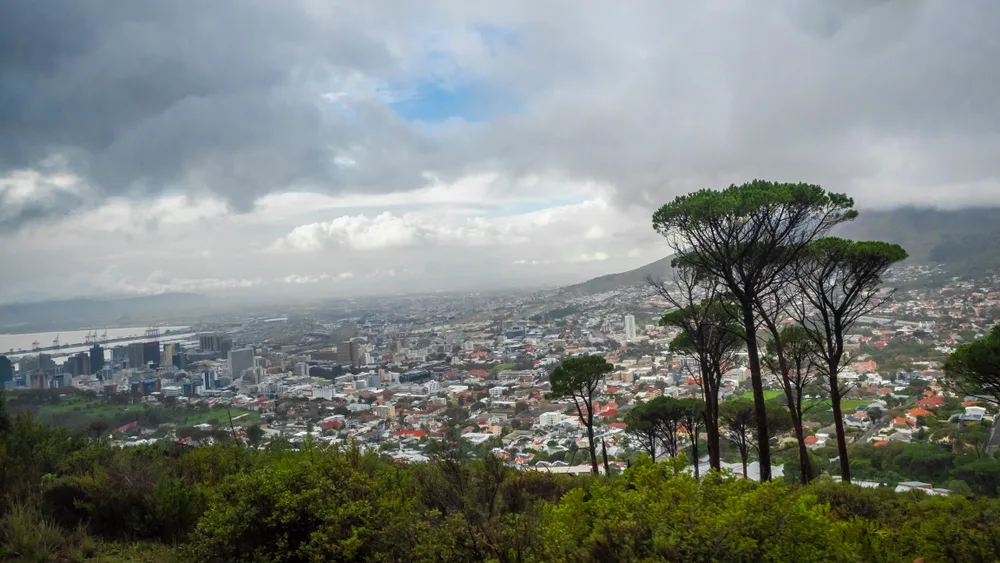
Ralph Steinebach/Shutterstock
The worst time to visit Cape Town is during peak summer between December and February. The summer months coincide with the holiday season, and most South African students are on summer break.
During this time, the weather is warm, reaching the high 70s to mid-80s Fahrenheit. Additionally, little rainfall contributes to dry conditions and the natural beauty of the Western Cape withers in the heat and desiccation.
The period between December and February is also when most tourists choose to visit South Africa so you can expect long lines, soaring prices, and crowded beaches.
However, if bar-hopping and mingling with foreigners is your scene — and you don’t mind higher travel and accommodation costs — you may prefer the summer months to Cape Town’s deserted winters.
You can still enjoy Cape Town’s many attractions and beaches during this time, and if you do your due diligence and search for promotions and specials, you may be able to work within a tighter budget.
Ultimately, there are advantages and disadvantages to visiting Cape Town during the summer. Still, if you book your trip closer to spring or autumn (late November-early, December, or late May-early June, respectively), you’ll have more luck enjoying the best of what Cape Town offers.
Cape Town by Month: Climate & Activities

Sergey Uryadnikov/Shutterstock
Still unsure about the best time to visit Cape Town? Take a look at our summary of the weather and climate by month below:
January
January in Cape Town is warm and dry, with temperatures ranging from 15 to 26°C (59-79°F). This month is ideal for visiting the stunning beaches like Clifton and Camps Bay, exploring the vibrant V&A Waterfront, and taking a cable car ride up Table Mountain for breathtaking views.
February
February continues with warm summer weather, perfect for hiking in the Kirstenbosch National Botanical Garden, enjoying wine tasting in the nearby Cape Winelands, and experiencing the colorful Cape Town Carnival.
March
As autumn begins, temperatures in Cape Town range from 14 to 25°C (57-77°F). March is great for exploring the Cape Point Nature Reserve, visiting the historic Robben Island, and attending the Cape Town International Jazz Festival.
April
Autumn temperatures in April range from 12 to 22°C (54-72°F). It’s an ideal time for whale watching off the coast, exploring the art galleries and museums in the city, and enjoying the Cape Town Comedy Festival.
May
May sees cooler temperatures from 9 to 20°C (48-68°F). Explore the indoor attractions like the Two Oceans Aquarium, enjoy the culinary delights at local restaurants, and visit the District Six Museum for a historical perspective.
June
Winter arrives with temperatures between 7 to 18°C (45-64°F). June offers opportunities for cozy wine tastings in front of a fireplace in the Cape Winelands, attending the Encounters Documentary Film Festival, and exploring the city’s coffee culture.
July
July maintains cool temperatures from 6 to 17°C (43-63°F). It’s a popular month for viewing the Southern Right Whales along the coast, attending the Knysna Oyster Festival if you’re up for a road trip, and exploring the indoor markets like the Old Biscuit Mill.
August
Temperatures in August range from 6 to 18°C (43-64°F). Visit the Kirstenbosch National Botanical Garden for beautiful winter greenery, enjoy the Cape Town Funny Festival, and explore the quaint streets of Bo-Kaap.
September
As spring begins, temperatures range from 8 to 19°C (46-66°F). September offers a pleasant transition, with opportunities for viewing the spectacular wildflowers in the West Coast National Park, attending the Hermanus Whale Festival, and exploring the beautiful beaches as they start to warm up.
October
October sees temperatures ranging from 11 to 21°C (52-70°F). It’s a great month for visiting the Table Mountain National Park for spring blooms, enjoying outdoor activities like kite surfing in Bloubergstrand, and attending the Cape Town International Kite Festival.
November
Spring temperatures in November range from 13 to 24°C (55-75°F). November is ideal for outdoor dining and exploring the Cape Peninsula, visiting the penguin colonies at Boulders Beach, and experiencing the open-air concerts at Kirstenbosch.
December
Summer returns with temperatures ranging from 15 to 25°C (59-77°F). December brings opportunities for festive season celebrations, enjoying beach days at Muizenberg and Llandudno, and celebrating New Year’s Eve with spectacular fireworks at the V&A Waterfront.
Frequently Asked Questions
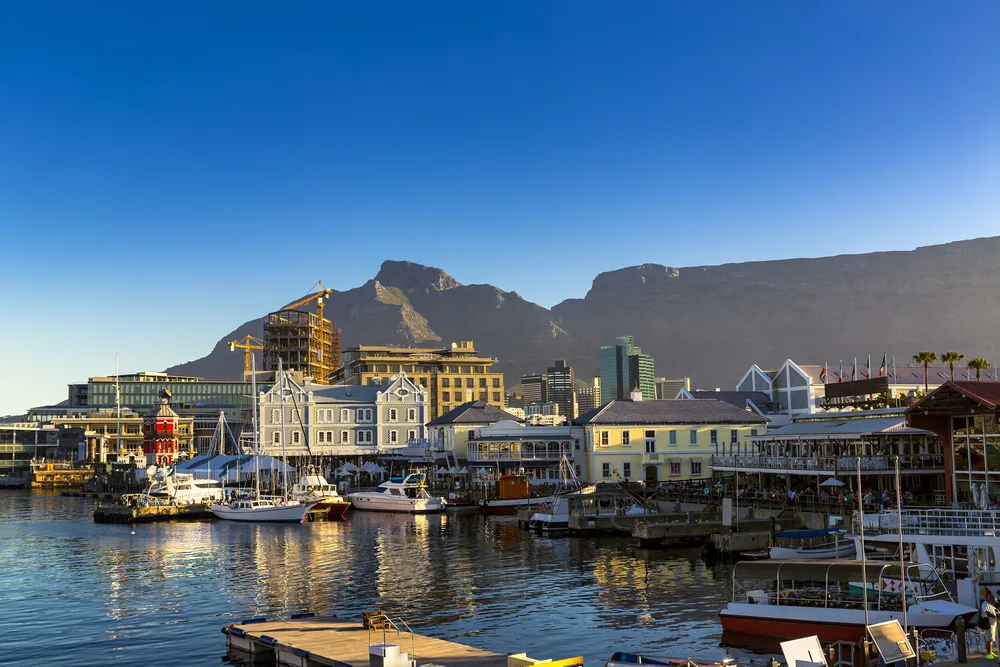
WitR/Shutterstock
Now that you are preparing for your trip, you may have questions. Consider the answers to our most frequently asked questions below before embarking on your journey to Cape Town:
How safe is Cape Town?
Cape Town is relatively safe, though you should exercise good judgment. South Africa is a developing country, so there are occasionally petty crimes (namely, theft) and specific areas you should only avoid with proper guidance, like the Khayelitsha shanty town.
Long Street, though popular, is also a pickpocketing hotspot, so secure your valuables carefully before heading out on an expedition.
How much should I budget for my trip to Cape Town?
Your budget will depend upon when you visit, the quality of your accommodations, and what you choose to do while you are there. The average cost of a 7-day trip is roughly $2,300 for a single traveler, $4,200 for couples, and $8,000 for families of four.
How does tipping work in Cape Town?
Tipping expectations in Cape Town are generally similar to those in the United States. Restaurant patrons are expected to tip 10 of the bill, and you should tip your valets, drivers, and guides as you would anywhere else.
How can I visit Cape Town on a budget?
If you are on a tight budget, consider visiting Cape Town in the winter when prices are the lowest. Additionally, plan to take public transportation and visit accessible landmarks and destinations, like Table Mountain, Boulders Beach, or the City Bowl.
You can also purchase cheap groceries and souvenirs from Green Market Square, an outdoor market in the City Bowl.
So, What’s the Best Time to Visit Cape Town?
It’s incredible destination at any time of year, but the overall best time to visit Cape Town for lower prices, optimal weather, and fewer tourists is in the autumn and spring months.
Consider visiting in the winter if you are on a budget or in the summer if you prioritize warm weather. It’s also relatively safe, affordable, and diverse — making it an excellent travel destination for single people, couples, and even families.
Just remember to follow the advice above to make it the best possible experience. Ultimately, your trip to Cape Town will be one to remember, regardless of when you choose to visit. Happy travels!



